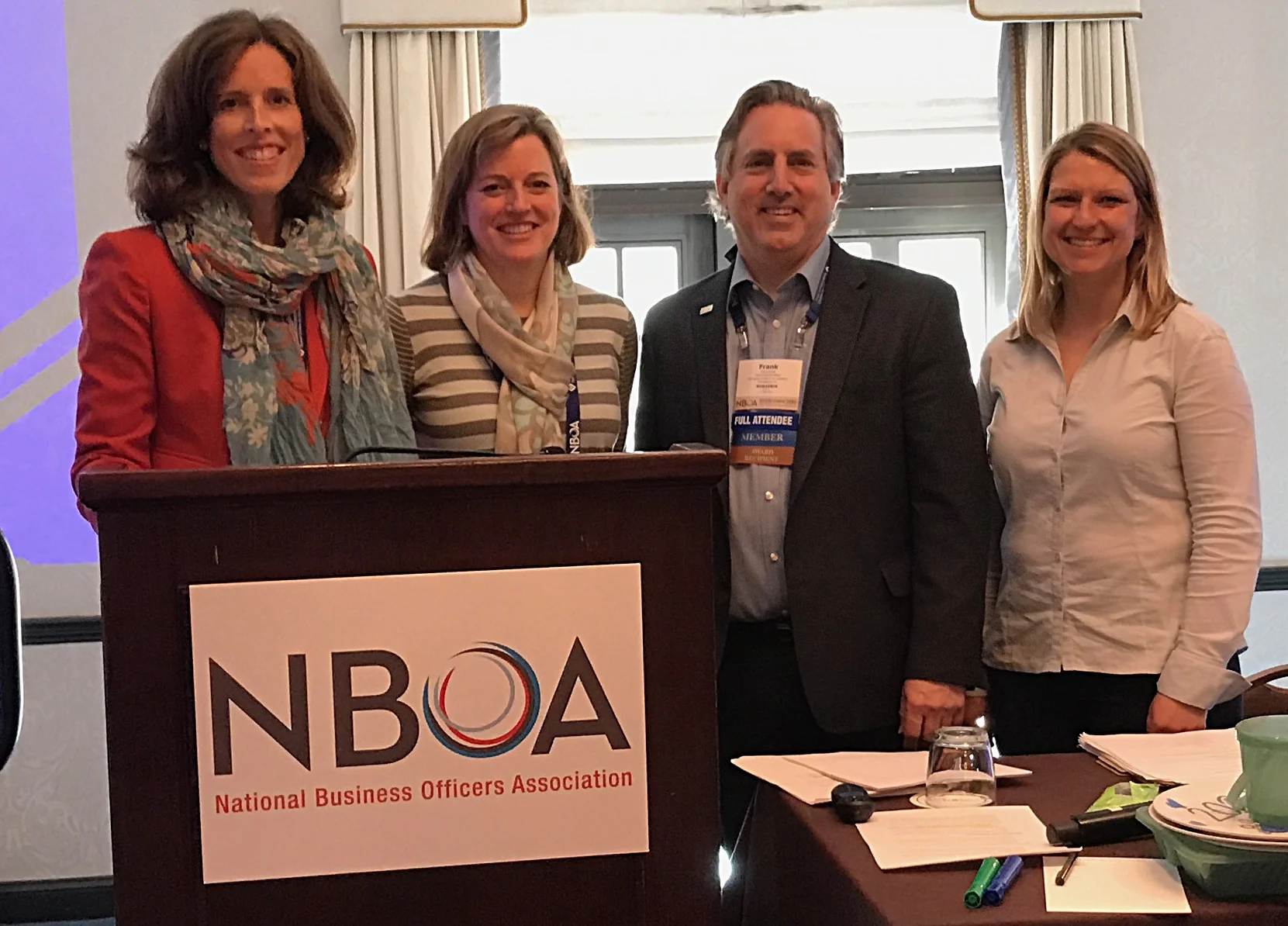At Abington Friends School (AFS), sustainability isn’t just a concept, it’s something that students are actively engaging with and exploring. Under the direction of Middle School science teacher Virginia Friedman, 7th-grade students took on a hands-on sustainability challenge: identifying areas where the school could reduce waste and become more environmentally responsible.
Brewing Sustainability: One Café’s Eco-Friendly Journey
At EB Coffee & Pub (EB), owner Justin Nichols and his team envision a vibrant community hub where every cup of coffee tells a story of quality, sustainability, and connection. From reducing waste with recyclable and reusable materials, to prioritizing local suppliers, and fostering partnerships with local community groups, the goal is to make sustainability an integral part of daily operations. EB Coffee & Pub demonstrates how small, local businesses can contribute to a sustainable future.
Case Study: Middlebury College’s Journey Towards a Carbon-Neutral Campus
Middlebury College has positioned itself as a leading environmentally-conscious institution and is one of the first colleges/universities in the world to achieve carbon neutrality. A core part of the college’s mission statement emphasizes “addressing the world’s most challenging problems” – a vision that the community has actively pursued through its deep commitment to environmentalism and sustainability. By creating a roadmap to achieve carbon neutrality by 2016, this vision has come to fruition, though the journey hasn’t always been easy.
Skidmore College Reimagines A Sustainable Landscape Plan
Skidmore College in Saratoga Springs, New York, is reimagining its campus grounds into a more sustainable one. After an 8 month long collaborative effort between Skidmore’s Sustainability Office, Skidmore’s Facilities Department, and a consulting group: The LA Group, a Sustainability Landscape Plan (SLP) was born. The SLP works in conjunction with two other informative Skidmore plans, the Campus Master Plan (2022) and the Sustainability Plan (2015-2025). The SLP helps pave a roadmap for future projects as the college continues to evolve.
2024 PAISBOA Sustainability Benchmarking Survey Results Are In
On March 6, PAISBOA Sustainability Group met virtually to review the Sustainability School Survey results, now in its third year. The survey aims to document the sustainability practices and progress among PAISBOA schools, and enables individual schools to see where they fall in comparison to peer institutions. PAISBOA’s Ron Hill and Boyer Sudduth’s Mary Ann Boyer and intern, Fernando Leon Rueda, shared the survey findings.
A Small School Tackles Big Changes: a Sustainable Renovation
Surrounded by 55 acres of lush green landscape, Dana Hall School is situated in the town of Wellesley, a suburb of Boston, MA. This independent boarding and day school for girls grades 5-12 is currently on an ambitious mission. Since July 2022, Dana Hall has been renovating their entire Upper School Building in a way that reflects their value for sustainability. Here is how this small school is tackling this big project.
Join the Team!
5 Tips for Earth-Friendly Holiday Wrapping
Six Grant Writing Tips to Green Your School
“Leading Change: Environmental Sustainability at Your School” Panel Discussion
On March 8, the PAISBOA Sustainability Group hosted a virtual panel discussion: “Leading Change: Environmental Sustainability at Your School.” Panelists included Lisa Carbone Warren, Director of Finance & Operations at Moorestown Friends School (MFS), and Carolyn Hapeman, Dean of Finance & Operations at Westtown School and Mary Ann Boyer of Boyer Sudduth Environmental Consultants.
Join the Team!
Disrupting the Throwaway Mindset: Moving Towards a “Circular Economy”
So--you might have heard the term circular economy thrown around before, but what exactly does it mean for schools? Proponents of a circular economy hope to combat our cognitively engrained throw-away culture, and focus instead on keeping materials in use for as long as possible. Schools have ample opportunity to engage with the circular economy framework, and ultimately align their actions with their organizational values.
Tools for Moving Your Campus to 100% Clean Energy
Educational institutions are instrumental in accelerating the transition to clean energy. As centers of scholarship, innovation, and technical expertise, they are well-positioned to lead the charge towards sustainability. Here are tools educational institutions can use to transition to clean energy as outlined in Environment America’s fact sheets, which can be found at https://environmentamerica.org. While written with higher education institutions in mind, much of the report’s guidance is applicable to K-12 schools as well.
PAISBOA Hosts Environmental Sustainability Webinar
With Earth Day around the corner, PAISBOA recently hosted a webinar on Leading Change: Environmental Sustainability. Sponsored by PECO Smart Energy, the program featured Mary Ann Boyer and Anne Sudduth of Boyer Sudduth Environmental Consultants along with Chief Financial Officers Frank Aloise from Springside Chestnut Hill Academy (SCH) and Miriam Fisher Schaefer of Friends Central School (FCS).
Philadelphia Sees Improving Air Quality as More People Work From Home
Since January, many cities around the world have been shutting down to slow the spread of coronavirus. In Philadelphia, the order to work from home issued by Governor Tom Wolf has forced all non-essential workers to remain home, which has been very disruptive to businesses and many people’s daily lives. However, the order is thought to have had a positive impact on the city’s air pollution.
PAR Recycle Works: Recycling Electronics & Restoring Lives
PAR Recycle Works (People Advancing Reintegration), a nonprofit electronics recycler, provides transitional employment to people returning from prison. This Germantown-based organization diverted over 250 tons of electronic waste (or “e-waste”) from the landfill. E-waste contains materials that can be upcycled or reused if recycled properly, such as the copper in wires or the gold in computer motherboards.
Aquaponics in the Classroom: PAISBOA Sustainability Group Visits Agnes Irwin School
The PAISBOA Sustainability Group convened at The Agnes Irwin School (AIS) on January 14th. Head of School, Dr. Wendy Hill, welcomed over 36 participants from 13 different institutions and highlighted how sustainability has been integrated into the buildings and classrooms at AIS along with a special focus on aquaponics.
Join the Team!
Top Tips For Getting started with Sustainable Food Services
Reading High School’s Green Committee Takes a Fresh Look at its Interior Courtyard
We’ve been working on something new…
Since August 2018, Boyer Sudduth Environmental Consultants met to organize, brainstorm, and plan -- and then organize, brainstorm and plan again, with Reading High School students, teachers and staff to develop a vision for a project that would invigorate their environmental education and school sustainability. Now it’s time for the big reveal…The Living Learning Laboratory Project. Reading High School will transform their unused school courtyard into a vibrant, biodiverse space where students can engage in hands-on STEAM learning outdoors.
The Green Committee at Reading High School believes “This project will foster a generation of citizens who are prepared to become creative and innovative leaders, to take care of their environment, and to actively participate in their community for years to come.” We think so, too!
Reading High School’s Green Committee members
RHS’s Green Committee of faculty and students review design drawings by Structure Green’s Ann Sellers (pictured second from left)
A section of the existing courtyard at RHS which will be renovated into a new outdoor learning space.
Science teacher and Green Committee faculty leader, Jeannine Michel, with one of RHS’s courtyard inhabitants--Big Mamma
We are so excited to work with a talented group of people: the students of the Eco Club, Faculty Green Committee Lead and Environmental Science teacher, Jeannine Michel (pictured below), landscape designer Ann Sellers, and agriculturalist Kent Himmelright of the Berks County Conservation District to make this vision possible. On April 11, the School will have a “Green Between” event from 3 to 5 pm with area community partners to raise awareness about the plans for the Courtyard. We hope to break ground late spring and during the summer. Check back in with us as this courtyard, and the Reading High School community, transform.
By Emma Schlam, Sustainability Intern at Boyer Sudduth Environmental Consultants, and grad student at Clark University pursuing dual degrees in Master of Business Administration and Master of Environmental Science and Policy.
























